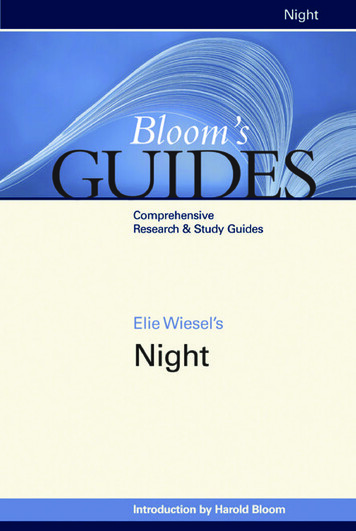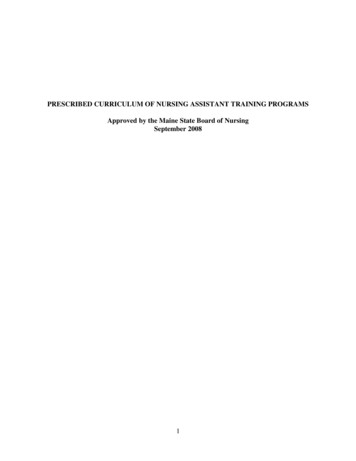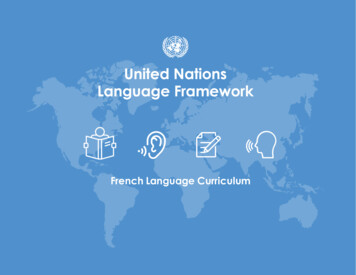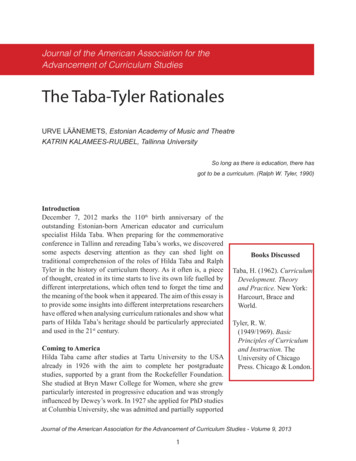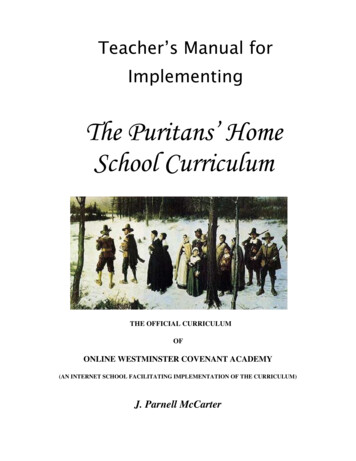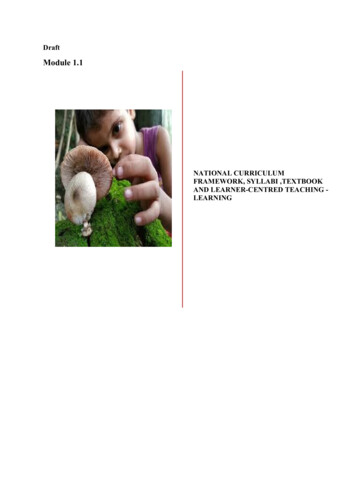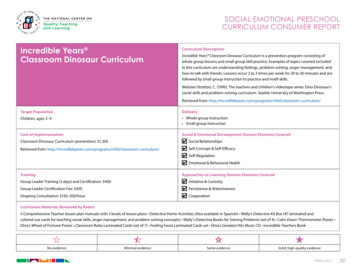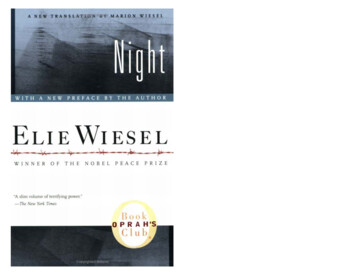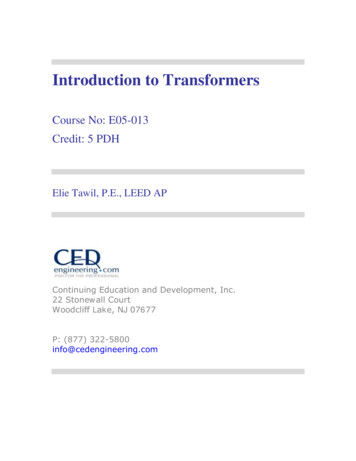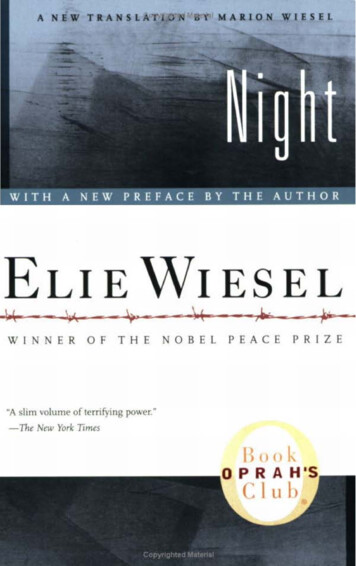
Transcription
Also by Elie WieselDAWNTHE OSLO ADDRESSDAY (previously THE ACCIDENT)TWILIGHTTHE TOWN BEYOND THE WALLTHE SIX DAYS OF DESTRUCTIONTHE GATES OF THE FORESTTHE JEWS OF SILENCELEGENDS OF OUR TIME(with Albert Friedlander)A JOURNEY INTO FAITH(conversations with JohnCardinal O'Connor)A BEGGAR IN JERUSALEMA SONG FOR HOPE (cantata)ONE GENERATION AFTERFROM THE KINGDOM OF MEMORYSOULS ON FIRESAGES AND DREAMERSTHE OATHTHE FORGOTTENANI MAAMIN (cantata)A PASSOVER HAGGADAH (illustratedZALMEN, OR THE MADNESS OF GOD(play)MESSENGERS OF GODA JEW TODAYFOUR HASIDIC MASTERSTHE TRIAL OF GOD (play)by Mark Podwal)ALL RIVERS RUN TO THE SEAMEMOIR IN TWO VOICES (withFrançois Mitterand)KING SOLOMON AND HIS MAGICRING (illustrated by MarkPodwal)THE TESTAMENTAND THE SEA IS NEVER FULLFIVE BIBLICAL PORTRAITSTHE JUDGESSOMEWHERE A MASTERCONVERSATIONS WITH ELIETHE GOLEM (illustrated by MarkPodwal)WIESEL (with Richard D.Heffner)THE FIFTH SONWISE MEN AND THEIR TALESAGAINST SILENCE (edited by IrvingTHE TIME OF THE UPROOTEDAbrahamson)
Night
ELIEWIESELT R A N S L A T E D FROM THE F R E N C H BY MARION W I E S E LH I L L A N D WANGA DIVISION OF FARRAR, STRAUS AND GIROUXNEW YORK
Hill and WangA division of Farrar, Straus and Giroux19 Union Square West, New York 10003Copyright 1958 by Les Editions de MinuitTranslation copyright 2006 by Marion WieselPreface to the New Translation copyright 2006 by Elie WieselNobel Peace Prize Acceptance Speech copyright 1986 by the Nobel FoundationAll rights reservedDistributed in Canada by Douglas & McIntyre Ltd.Printed in the United States of AmericaPublished simultaneously in hardcover and paperback by Hill and WangFirst edition of this translation, 2006Library of Congress Control Number: 2005936797Hardcover ISBN-13: 978-0-374-39997-9Hardcover ISBN-10:0-374-39997-2Paperback ISBN-13:9 78-0-3 74-50001-6Paperback ISBN-10:0-374-50001-0Designed by Abby Kaganwww.fsgbooks.com1719201816
In memory ofmy parents and of my little sister, TziporaE.W.This new translationin memory ofmy grandparents, Abba, Sarah and Nachman,who also vanished into that nightM.W.
Preface to the New Translationby Elie WieselIonly one book, this wouldbe the one. Just as the past lingers in the present, all my writings after Night, including those that deal with biblical, Talmudic, or Hasidic themes, profoundly bear its stamp, and cannotbe understood if one has not read this very first of my works.Why did I write it?F IN MY L I F E T I M E I WAS TO WRITEDid I write it so as not to go mad or, on the contrary, to go madin order to understand the nature of madness, the immense, terrifying madness that had erupted in history and in the conscienceof mankind?Was it to leave behind a legacy of words, of memories, to helpprevent history from repeating itself?Or was it simply to preserve a record of the ordeal I endured asan adolescent, at an age when one's knowledge of death and evilshould be limited to what one discovers in literature?There are those who tell me that I survived in order to writethis text. I am not convinced. I don't know how I survived; I wasweak, rather shy; I did nothing to save myself. A miracle? Certainly not. If heaven could or would perform a miracle for me,
why not for others more deserving than myself? It was nothingmore than chance. However, having survived, I needed to givesome meaning to my survival. Was it to protect that meaning thatI set to paper an experience in which nothing made any sense?In retrospect I must confess that I do not know, or no longerknow, what I wanted to achieve with my words. I only know thatwithout this testimony, my life as a writer—or my life, period—would not have become what it is: that of a witness who believeshe has a moral obligation to try to prevent the enemy from enjoying one last victory by allowing his crimes to be erased fromhuman memory.For today, thanks to recently discovered documents, the evidence shows that in the early days of their accession to power, theNazis in Germany set out to build a society in which there simplywould be no room for Jews. Toward the end of their reign, theirgoal changed: they decided to leave behind a world in ruins inwhich Jews would seem never to have existed. That is why everywhere in Russia, in the Ukraine, and in Lithuania, the Einsatzgruppen carried out the Final Solution by turning their machineguns on more than a million Jews, men, women, and children, andthrowing them into huge mass graves, dug just moments beforeby the victims themselves. Special units would then disinter thecorpses and burn them. Thus, for the first time in history, Jewswere not only killed twice but denied burial in a cemetery.It is obvious that the war which Hitler and his accompliceswaged was a war not only against Jewish men, women, and children, but also against Jewish religion, Jewish culture, Jewish tradition, therefore Jewish memory.in history would be judgedone day, I knew that I must bear witness. I also knew that, whileCONVINCED THAT THISPERIOD
I had many things to say, I did not have the words to say them.Painfully aware of my limitations, I watched helplessly as language became an obstacle. It became clear that it would be necessary to invent a new language. But how was one to rehabilitateand transform words betrayed and perverted by the on—fire—chimney:these words all have intrinsic meaning, but in those times, theymeant something else. Writing in my mother tongue—at thatpoint close to extinction—I would pause at every sentence, andstart over and over again. I would conjure up other verbs, otherimages, other silent cries. It still was not right. But what exactlywas "it"? "It" was something elusive, darkly shrouded for fear ofbeing usurped, profaned. All the dictionary had to offer seemedmeager, pale, lifeless. Was there a way to describe the last journey in sealed cattle cars, the last voyage toward the unknown? Orthe discovery of a demented and glacial universe where to be inhuman was human, where disciplined, educated men in uniformcame to kill, and innocent children and weary old men came todie? Or the countless separations on a single fiery night, the tearing apart of entire families, entire communities? Or, incredibly,the vanishing of a beautiful, well-behaved little Jewish girl withgolden hair and a sad smile, murdered with her mother the verynight of their arrival? How was one to speak of them withouttrembling and a heart broken for all eternity?Deep down, the witness knew then, as he does now, thathis testimony would not be received. After all, it deals with anevent that sprang from the darkest zone of man. Only thosewho experienced Auschwitz know what it was. Others will neverknow.But would they at least understand?Could men and women who consider it normal to assist theweak, to heal the sick, to protect small children, and to respect
the wisdom of their elders understand what happened there?Would they be able to comprehend how, within that cursed universe, the masters tortured the weak and massacred the children,the sick, and the old?And yet, having lived through this experience, one could notkeep silent no matter how difficult, if not impossible, it was tospeak.And so I persevered. And trusted the silence that envelopsand transcends words. Knowing all the while that any one of thefields of ashes in Birkenau carries more weight than all the testimonies about Birkenau. For, despite all my attempts to articulatethe unspeakable, "it" is still not right.Is that why my manuscript—written in Yiddish as "And theWorld Remained Silent" and translated first into French, theninto English—was rejected by every major publisher, French andAmerican, despite the tireless efforts of the great Catholic Frenchwriter and Nobel laureate François Mauriac? After months andmonths of personal visits, letters, and telephone calls, he finallysucceeded in getting it into print.Though I made numerous cuts, the original Yiddish versionstill was long. Jérôme Lindon, the legendary head of the small butprestigious Éditions de Minuit, edited and further cut the Frenchversion. I accepted his decision because I worried that somethings might be superfluous. Substance alone mattered. I wasmore afraid of having said too much than too little.Example: in the Yiddish version, the narrative opens withthese cynical musings:In the beginning there was faith—which is childish; trust—whichis vain; and illusion—which is dangerous.We believed in God, trusted in man, and lived with the illu-
sion that every one of us has been entrusted with a sacred sparkfrom the Shekhinah's flame; that every one of us carries in hiseyes and in his soul a reflection of God's image.That was the source if not the cause of all our ordeals.Other passages from the original Yiddish text had more on thedeath of my father and on the Liberation. Why not include thosein this new translation? Too personal, too private, perhaps; theyneed to remain between the lines. And y e t I remember that night, the most horrendous of my life: Eliezer, my son, come h e r e I want to tell yous o m e t h i n g Only to y o u C o m e , don't leave me alone Eliezer "I heard his voice, grasped the meaning of his words and thetragic dimension of the moment, yet I did not move.It had been his last wish to have me next to him in his agony,at the moment when his soul was tearing itself from his laceratedbody—yet I did not let him have his wish.I was afraid.Afraid of the blows.That was why I remained deaf to his cries.Instead of sacrificing my miserable life and rushing to hisside, taking his hand, reassuring him, showing him that he wasnot abandoned, that I was near him, that I felt his sorrow, insteadof all that, I remained flat on my back, asking God to make myfather stop calling my name, to make him stop crying. So afraidwas I to incur the wrath of the SS.In fact, my father was no longer conscious.Yet his plaintive, harrowing voice went on piercing the silence and calling me, nobody but me.
"Well?" The SS had flown into a rage and was striking myfather on the head: "Be quiet, old man! Be quiet!"My father no longer felt the club's blows; I did. And yet I didnot react. I let the SS beat my father, I left him alone in theclutches of death. Worse: I was angry with him for having beennoisy, for having cried, for provoking the wrath of the SS."Eliezer! Eliezer! Come, don't leave me a l o n e "His voice had reached me from so far away, from so close. ButI had not moved.I shall never forgive myself.Nor shall I ever forgive the world for having pushed meagainst the wall, for having turned me into a stranger, for havingawakened in me the basest, most primitive instincts.His last word had been my name. A summons. And I had notresponded.In the Yiddish version, the narrative does not end with the image in the mirror, but with a gloomy meditation on the present:And now, scarcely ten years after Buchenwald, I realize that theworld forgets quickly. Today, Germany is a sovereign state. TheGerman Army has been resuscitated. Use Koch, the notorioussadistic monster of Buchenwald, was allowed to have childrenand live happily ever a f t e r W a r criminals stroll through thestreets of Hamburg and Munich. The past seems to have beenerased, relegated to oblivion.Today, there are anti-Semites in Germany, France, and eventhe United States who tell the world that the "story" of six million assassinated Jews is nothing but a hoax, and many people,not knowing any better, may well believe them, if not today thentomorrow or the day a f t e r I am not so naive as to believe that this slim volume will
change the course of history or shake the conscience of theworld.Books no longer have the power they once did.Those who kept silent yesterday will remain silent tomorrow.would be entitled to ask: Why this new translation,since the earlier one has been around for forty-five years? If it isnot faithful or not good enough, why did I wait so long to replaceit with one better and closer to the original?T H E READERIn response, I would say only that back then, I was an unknown writer who was just getting started. My English was farfrom good. When my British publisher told me that he had founda translator, I was pleased. I later read the translation and itseemed all right. I never reread it. Since then, many of my otherworks have been translated by Marion, my wife, who knows myvoice and how to transmit it better than anyone else. I am fortunate: when Farrar, Straus and Giroux asked her to prepare a newtranslation, she accepted. I am convinced that the readers will appreciate her work. In fact, as a result of her rigorous editing, I wasable to correct and revise a number of important details.And so, as I reread this text written so long ago, I am glad thatI did not wait any longer. And yet, I still wonder: Have I used theright words? I speak of my first night over there. The discovery ofthe reality inside the barbed wire. The warnings of a "veteran"inmate, counseling my father and myself to lie about our ages: myfather was to make himself younger, and I older. The selection.The march toward the chimneys looming in the distance underan indifferent sky. The infants thrown into fiery d i t c h e s I didnot say that they were alive, but that was what I thought. But thenI convinced myself: no, they were dead, otherwise I surely wouldhave lost my mind. And yet fellow inmates also saw them; they
were alive when they were thrown into the flames. Historians,among them Telford Taylor, confirmed it. And yet somehow I didnot lose my mind.this introduction, I believe it important toemphasize how strongly I feel that books, just like people, have adestiny. Some invite sorrow, others joy, some both.BEFORE CONCLUDINGEarlier, I described the difficulties encountered by Night before its publication in French, forty-seven years ago. Despiteoverwhelmingly favorable reviews, the book sold poorly. The subject was considered morbid and interested no one. If a rabbi happened to mention the book in his sermon, there were alwayspeople ready to complain that it was senseless to "burden ourchildren with the tragedies of the Jewish past."Since then, much has changed. Night has been received inways that I never expected. Today, students in high schools andcolleges in the United States and elsewhere read it as part of theircurriculum.How to explain this phenomenon? First of all, there has beena powerful change in the public's attitude. In the fifties andsixties, adults born before or during World War II showeda careless and patronizing indifference toward what is so inadequately called the Holocaust. That is no longer true.Back then, few publishers had the courage to publish bookson that subject.Today, such works are on most book lists. The same is true inacademia. Back then, few schools offered courses on the subject.Today, many do. And, strangely, those courses are particularlypopular. The topic of Auschwitz has become part of mainstreamculture. There are films, plays, novels, international conferences,exhibitions, annual ceremonies with the participation of the na-
tion's officialdom. The most striking example is that of theUnited States Holocaust Memorial Museum in Washington, D.C.;it has received more than twenty-two million visitors since itsinauguration in 1993.This may be because the public knows that the number ofsurvivors is shrinking daily, and is fascinated by the idea of sharing memories that will soon be lost. For in the end, it is all aboutmemory, its sources and its magnitude, and, of course, its consequences.For the survivor who chooses to testify, it is clear: his duty is tobear witness for the dead and for the living. He has no right to deprive future generations of a past that belongs to our collectivememory. To forget would be not only dangerous but offensive; toforget the dead would be akin to killing them a second time.if I know "the response to Auschwitz"; Ianswer that not only do I not know it, but that I don't even knowif a tragedy of this magnitude has a response. What I do know isthat there is "response" in responsibility. When we speak of thisera of evil and darkness, so close and yet so distant, "responsibility" is the key word.SOMETIMES I AM ASKEDThe witness has forced himself to testify. For the youth of today, for the children who will be born tomorrow. He does notwant his past to become their future.E.W.
Forewordby François MauriacFOREIGN JOURNALISTS frequently come to see me. I amwary of them, torn as I am between my desire to speak tothem freely and the fear of putting weapons into thehands of interviewers whose attitude toward France I do notknow. During these encounters, I tend to be on my guard.That particular morning, the young Jew who came to interview me on behalf of a Tel Aviv daily won me over from the firstmoment. Our conversation very quickly became more personal.Soon I was sharing with him memories from the time of the Occupation. It is not always the events that have touched us personallythat affect us the most. I confided to my young visitor that nothing I had witnessed during that dark period had marked me asdeeply as the image of cattle cars filled with Jewish children atthe Austerlitz train s t a t i o n Y e t I did not even see them withmy own eyes. It was my wife who described them to me, still under the shock of the horror she had felt. At that time we knewnothing about the Nazis' extermination methods. And who couldhave imagined such things! But these lambs torn from theirmothers, that was an outrage far beyond anything we would have
thought possible. I believe that on that day, I first became awareof the mystery of the iniquity whose exposure marked the end ofan era and the beginning of another. The dream conceived byWestern man in the eighteenth century, whose dawn he thoughthe had glimpsed in 1789, and which until August 2, 1914, had become stronger with the advent of the Enlightenment and scientific discoveries—that dream finally vanished for me before thosetrainloads of small children. And yet I was still thousands of milesaway from imagining that these children were destined to feedthe gas chambers and crematoria.This, then, was what I probably told this journalist. And whenI said, with a sigh, "I have thought of these children so manytimes!" he told me, "I was one of them." He was one of them!He had seen his mother, a beloved little sister, and most of hisfamily, except his father and two other sisters, disappear in afurnace fueled by living creatures. As for his father, the boy hadto witness his martyrdom day after day and, finally, his agonyand death. And what a death! The circumstances of it are narratedin this book, and I shall allow readers—who should be as numerous as those reading The Diary of Anne Frank—to discover themfor themselves as well as by what miracle the child himselfescaped.I maintain therefore that this personal record, coming as itdoes after so many others and describing an abomination such aswe might have thought no longer had any secrets for us, is different, distinct, and unique nevertheless. The fate of the Jews of thesmall town in Transylvania called Sighet; their blindness as theyconfronted a destiny from which they would have still had timeto flee; the inconceivable passivity with which they surrenderedto it, deaf to the warnings and pleas of a witness who, having escaped the massacre, relates to them what he has seen with hisown eyes, but they refuse to believe him and call him a mad-
man—this set of circumstances would surely have sufficed to inspire a book to which, I believe, no other can be compared.It is, however, another aspect of this extraordinary book thathas held my attention. The child who tells us his story here wasone of God's chosen. From the time he began to think, he livedonly for God, studying the Talmud, eager to be initiated into theKabbalah, wholly dedicated to the Almighty. Have we ever considered the consequence of a less visible, less striking abomination, yet the worst of all, for those of us who have faith: the deathof God in the soul of a child who suddenly faces absolute evil?Let us try to imagine what goes on in his mind as his eyeswatch rings of black smoke unfurl in the sky, smoke that emanates from the furnaces into which his little sister and his motherhad been thrown after thousands of other victims:Never shall I forget that night, the first night in camp, that turnedmy life into one long night seven times sealed.Never shall I forget that smoke.Never shall I forget the small faces of the children whosebodies I saw transformed into smoke under a silent sky.Never shall I forget those flames that consumed my faith forever.Never shall I forget the nocturnal silence that deprived mefor all eternity of the desire to live.Never shall I forget those moments that murdered my Godand my soul and turned my dreams to ashes.Never shall I forget those things, even were I condemned tolive as long as God Himself.Never.It was then that I understood what had first appealed to meabout this young Jew: the gaze of a Lazarus risen from the dead
yet still held captive in the somber regions into which he hadstrayed, stumbling over desecrated corpses. For him, Nietzsche'scry articulated an almost physical reality: God is dead, the God oflove, of gentleness and consolation, the God of Abraham, Isaac,and Jacob had, under the watchful gaze of this child, vanished forever into the smoke of the human holocaust demanded by theRace, the most voracious of all idols.And how many devout Jews endured such a death? On thatmost horrible day, even among all those other bad days, when thechild witnessed the hanging (yes!) of another child who, he tellsus, had the face of a sad angel, he heard someone behind himgroan:"For God's sake, where is God?"And from within me, I heard a voice answer:"Where He is? This is where—hanging here from this gallows."On the last day of the Jewish year, the child is present at thesolemn ceremony of Rosh Hashanah. He hears thousands ofslaves cry out in unison, "Blessed be the Almighty!" Not so longago, he too would have knelt down, and with such worship, suchawe, such love! But this day, he does not kneel, he stands. Thehuman creature, humiliated and offended in ways that are inconceivable to the mind or the heart, defies the blind and deafdivinity.I no longer pleaded for anything. I was no longer able to lament.On the contrary, I felt very strong. I was the accuser, God the accused. My eyes had opened and I was alone, terribly alone in aworld without God, without man. Without love or mercy. I wasnothing but ashes now, but I felt myself to be stronger than this
Almighty to whom my life had been bound for so long. In themidst of these men assembled for prayer, I felt like an observer,a stranger.And I, who believe that God is love, what answer was there togive my young interlocutor whose dark eyes still held the reflection of the angelic sadness that had appeared one day on the faceof a hanged child? What did I say to him? Did I speak to him ofthat other Jew, this crucified brother who perhaps resembled himand whose cross conquered the world? Did I explain to him thatwhat had been a stumbling block for his faith had become a cornerstone for mine? And that the connection between the cross andhuman suffering remains, in my view, the key to the unfathomable mystery in which the faith of his childhood was lost? Andyet, Zion has risen up again out of the crematoria and the slaughterhouses. The Jewish nation has been resurrected from amongits thousands of dead. It is they who have given it new life. We donot know the worth of one single drop of blood, one single tear.All is grace. If the Almighty is the Almighty, the last word for eachof us belongs to Him. That is what I should have said to the Jewish child. But all I could do was embrace him and weep.
Night1
2
TMoishe the Beadle, as if his entirelife he had never had a surname. He was the jack-ofall-trades in a Hasidic house of prayer, a shtibl. The Jewsof Sighet—the little town in Transylvania where I spent my childhood—were fond of him. He was poor and lived in utter penury.As a rule, our townspeople, while they did help the needy, didnot particularly like them. Moishe the Beadle was the exception. He stayed out of people's way. His presence bothered noone. He had mastered the art of rendering himself insignificant,invisible.HEY C A L L E D HIMPhysically, he was as awkward as a clown. His waiflike shynessmade people smile. As for me, I liked his wide, dreamy eyes, gazing off into the distance. He spoke little. He sang, or rather hechanted, and the few snatches I caught here and there spoke ofdivine suffering, of the Shekhinah in Exile, where, according toKabbalah, it awaits its redemption linked to that of man.I met him in 1941. I was almost thirteen and deeply observant.By day I studied Talmud and by night I would run to the synagogue to weep over the destruction of the Temple.3
One day I asked my father to find me a master who couldguide me in my studies of Kabbalah. "You are too young for that.Maimonides tells us that one must be thirty before venturing intothe world of mysticism, a world fraught with peril. First you muststudy the basic subjects, those you are able to comprehend."My father was a cultured man, rather unsentimental. He rarelydisplayed his feelings, not even within his family, and was moreinvolved with the welfare of others than with that of his own kin.The Jewish community of Sighet held him in highest esteem; hisadvice on public and even private matters was frequently sought.There were four of us children. Hilda, the eldest; then Bea; I wasthe third and the only son; Tzipora was the youngest.My parents ran a store. Hilda and Bea helped with the work.As for me, my place was in the house of study, or so they said."There are no Kabbalists in Sighet," my father would oftentell me.He wanted to drive the idea of studying Kabbalah from mymind. In vain. I succeeded on my own in finding a master for myself in the person of Moishe the Beadle.He had watched me one day as I prayed at dusk."Why do you cry when you pray?" he asked, as though heknew me well."I don't know," I answered, troubled.I had never asked myself that question. I cried becausebecause something inside me felt the need to cry. That was allI knew."Why do you pray?" he asked after a moment.Why did I pray? Strange question. Why did I live? Why didI breathe?"I don't know," I told him, even more troubled and ill at ease."I don't know."From that day on, I saw him often. He explained to me, with4
great emphasis, that every question possessed a power that waslost in the answer Man comes closer to God through the questions he asks Him,he liked to say. Therein lies true dialogue. Man asks and Godreplies. But we don't understand His replies. We cannot understand them. Because they dwell in the depths of our souls and remain there until we die. The real answers, Eliezer, you will findonly within yourself."And why do you pray, Moishe?" I asked him."I pray to the God within me for the strength to ask Him thereal questions."We spoke that way almost every evening, remaining in thesynagogue long after all the faithful had gone, sitting in the semidarkness where only a few half-burnt candles provided a flickering light.One evening, I told him how unhappy I was not to be able tofind in Sighet a master to teach me the Zohar, the Kabbalisticworks, the secrets of Jewish mysticism. He smiled indulgently.After a long silence, he said, "There are a thousand and one gatesallowing entry into the orchard of mystical truth. Every humanbeing has his own gate. He must not err and wish to enter the orchard through a gate other than his own. That would present adanger not only for the one entering but also for those who arealready inside."And Moishe the Beadle, the poorest of the poor of Sighet,spoke to me for hours on end about the Kabbalah's revelations andits mysteries. Thus began my initiation. Together we would read,over and over again, the same page of the Zohar. Not to learn it byheart but to discover within the very essence of divinity.And in the course of those evenings I became convinced thatMoishe the Beadle would help me enter eternity, into that timewhen question and answer would become ONE.5
AND THEN, one day all foreign Jews were expelled from Sighet.And Moishe the Beadle was a foreigner.Crammed into cattle cars by the Hungarian police, they criedsilently. Standing on the station platform, we too were crying.The train disappeared over the horizon; all that was left was thick,dirty smoke.Behind me, someone said, sighing, "What do you expect?That's w a r "The deportees were quickly forgotten. A few days after theyleft, it was rumored that they were in Galicia, working, and eventhat they were content with their fate.Days went by. Then weeks and months. Life was normalagain. A calm, reassuring wind blew through our homes. Theshopkeepers were doing good business, the students lived amongtheir books, and the children played in the streets.One day, as I was about to enter the synagogue, I saw Moishethe Beadle sitting on a bench near the entrance.He told me what had happened to him and his companions.The train with the deportees had crossed the Hungarian borderand, once in Polish territory, had been taken over by the Gestapo.The train had stopped. The Jews were ordered to get off and ontowaiting trucks. The trucks headed toward a forest. There everybody was ordered to get out. They were forced to dig hugetrenches. When they had finished their work, the men from theGestapo began theirs. Without passion or haste, they shot their prisoners, who were forced to approach the trench one by one and offertheir necks. Infants were tossed into the air and used as targets forthe machine guns. This took place in the Galician forest, near Kolomay. How had he, Moishe the
of all that, I remained flat on my back, asking God to make my father stop calling my name, to make him stop crying. So afraid was I to incur the wrath of the SS. In fact, my father was no longer conscious. Yet his plaintive, harrowing voice wen
